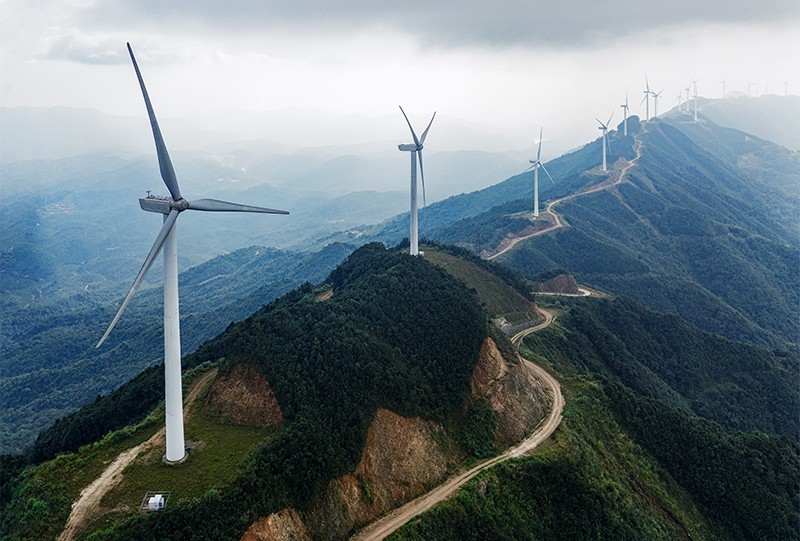The China push for a cleaner and cooler planet
August 15, 2021
_Not a day passes without our media damning China for some imagined infamy or other. So many stories, so many column inches, and nothing positive to be found. At the same time, our television screens are full of other images; real images of a disaster that is enveloping us all.
_
We see our planet ablaze, lashed by violent storms, lives disrupted, and our very survival being threatened by climate change. The expert advice is that things are getting worse as emissions grow. China does head the global list as the highest emitter of CO2 and by some distance. Statistically, however, its emissions per capita are half those of the US or Australia. It is still building coal-fired power stations, although is committed to cutting emissions by 65 per cent by 2030 and achieving a net-zero target by 2060.
Those figures might not please everybody but, if those who spend their time stirring up anti-Chinese sentiment would pause, for just a moment, they might just see what can be done about climate destruction and what is being done in China.
The world knows that our future does not lie with fossil fuel and nor can the future of transportation be based on fossil fuel. President Biden has spoken strongly of shifting the focus from petrol to electric cars and has called for 50 per cent electric being sold in 2030 to be electric. This is to his credit, although he does acknowledge that the figure is in no way to be seen as binding. But what about public transport and electric buses? As of today, there is just one city in the world whose bus system is entirely electric. It is Shenzhen in China. Its public transport fleet runs 16,000 buses. There are also 22,000 electric taxis operating in Shenzhen. In a very short space of time, nine more major world cities will be added to the list of all-electric cities. All of these will be in China. By contrast, London and Santiago, the next best users of electric transport, each run about 200 electric buses and there are 300 in total in the US.
There are now over 400,000 electric buses operating across China. What this means for emissions is important. One thousand electric cars save 15 barrels of oil per day. By way of contrast, 500 barrels of diesel are saved when 1,000 electric buses take to the streets. The Chinese initiative has meant that 270,000 fewer barrels of diesel are being consumed every single day! This adds up to a reduction of more than 98 million barrels a year, which will see 42 million tonnes less CO2 being released into the atmosphere or the equivalent of 10 per cent of Australias total CO2 emissions.
There are moves in other countries to ramp up conversion to electric buses which is encouraging but no country is coming anywhere near the figures from China. This begs the question, why? Governments are so often conflicted things. On the one hand, is an existential need to resolve a crisis and on the other is an economic imperative. All too often short-term economic factors override the social good. The Chinese example shows that this can be reversed. Each Chinese electric bus comes with a price tag of a little over $100,000. This money is granted to the public transport provider by the state. The social good obviously outweighs any consideration of cost and there is no profit margin to be considered.
Earlier this year, the Chinese government launched its 14th Five Year Plan. This has important implications for its response to climate change and to how business is conducted. The five-year period until 2025 will see total CO2 emissions drop by 18 per cent. China Baouwu (the worlds largest steel company) will see its CO2 emissions peak in 2023, as will the emissions from Sinopec (the worlds largest oil refiner).
The Five-Year Plan has acknowledged that the shift to a net-zero emissions regime will have significant impacts on all sectors of society and specifically in those areas that are currently reliant on coal. Coal is being phased out. The Chinese have stressed that operations will, in all likelihood, be shifted to regions of the country where renewable energy sources are more cost-effective. The social and demographic dislocations are being factored in as the country seriously accepts its responsibilities to the world and its people.
While all of this is going on in real-time, the world continues to hurtle toward the abyss. The 2021 United Nations Climate Change Conference in Glasgow this November is being seen as a crucial meeting. Emissions must be cut by 45 per cent in the next decade if the global temperature rise is to be no greater than 1.5 degrees, but there are ominous signs that they will continue to rise along with the temperature. Few have any optimism that such a target can be achieved.
Fatih Birol, the executive director of the International Energy Agency, recently admitted that the statistics are “shocking and very disturbing. On the one hand, governments today are saying climate change is their priority. But on the other hand, we are seeing the second biggest emissions rise in history. It is really disappointing.”
No nation is exempt from criticism. Governments and corporations share the blame for the destruction. Significant changes are clearly needed. Our television screens remind us of this every night. The future is perilous, but surely it is only right and proper to give credit where it is due. Is it too much to expect that our media might take a day or two out from its work of damning China with no justifiable cause instead and giving it some praise for what it is actually doing?

